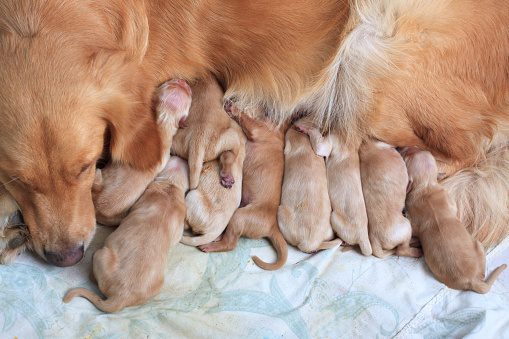
We previously published a post discussing some of the common problems dogs have while in labor. This is a follow-up to that post with some information about common problems after whelping.
Your poor dog is exhausted and now supporting several puppies—keep her comfortable and allow her lots of time t o rest! Expectations and tips for post-whelping behavior and care are as follows:
- Make sure she is eating and drinking well.
- Keep her hind end clean, as there will be discharge for a while.
- Go outside with her to make sure that she is urinating and defecating normally.
- Diarrhea is common after whelping, and a probiotic supplement may help.
- Once the puppies start nursing vigorously, the mother’s appetite usually increases significantly.
- Lactation is the greatest energy demand a dog will ever experience. Palpate over the bitch’s ribs regularly to check her weight. You should be able to feel them easily, but not see them easily.
Bulleted information courtesy Veazievet.com
Many dogs experience the following after the puppies are born:
Metritis: An inflammation of the uterine lining.
Eclampsia: Occurs when a dog has a hard time keeping up with the calcium demands on her body from nursing her pups.
Mastitis: An infection of the mammary glands. Normal glands are large and soft; infected glands are large, red and hard.
Hemorrhaging: A loss of a large amount of blood after labor. Bring your pet to the ER immediately.
Retained puppy/placenta: This occurs when a dog fails to deliver all her pups or her placenta.
All of these complications can manifest shortly after labor to a few weeks following. Symptoms that you should watch for are:
- persistent vomiting
- dehydration
- lack of appetite
- depression
- weakness
- green vaginal discharge
Bulleted information courtesy Medicanimal.com
Keep in mind that certain breeds are predisposed to various problems during pregnancy. Talk to your vet about your dog and educate yourself on what to expect for your dog’s breed. Be extra observant of your dog’s behavior and call the vet with any concerns. Most of all, treat your dog with a lot of extra TLC and enjoy all those adorable puppies!
(We will be following up this post with one on newborn puppy care—stay tuned!)
Recent Posts
About Us
Ann Arbor Animal Hospital is a locally-owned animal hospital operating for over 90 years in Ann Arbor, MI.
